By: Evan Meyers, Assistant News Editor
“As a survivor of the Rwandan genocide, I know that a nation cannot heal, cannot recover from a history of violence and injustice without creating the places to remember, where the truth can be told,” Jonathan Kubakundimana 16’.
Feb. 27, 2019, the Riley Center’s Advance Team will be hosting “The Sun Does Shine: How I Found Life and Freedom on Death Row,” an event with Anthony Ray Hinton, who spent 30 years in Alabama’s prison system for a crime he did not commit. That evening, from 7-8:30 p.m. the Riley Center Advance Team hopes to transform McAlister Auditorium into a place where truth can be told.
Advance Team Leader, Jack Ligon, claims that the Riley Center wanted to organize an event concerning the criminal justice system because criminal justice reform is “an issue everyone should care about.” Jonathan Kubakundimana, a Furman and Riley Center alumnus, was then able to connect the Advance Team with Mr. Hinton, who Kubakundimana works with closely at the Equal Justice Institute (EJI) in Montgomery, Ala.
The Equal Justice Initiative is an organization founded by Bryan Stevenson that is committed to ending mass incarceration and excessive punishment in the United States, to challenging racial and economic injustice, and to protecting basic human rights for the most vulnerable people in American society. For Kubakundimana, these objectives are all intertwined and deeply connected to history. It is crucial to “situate issues of criminal justice within the context of this nation’s history of racial and economic injustice,” Kubakundimana explains.
In order to accomplish their goals, EJI works to “change the narrative.” This means giving individuals like Mr. Hinton a platform to tell their stories. Their bravery in speaking out helps shine a light on lasting flaws in the American criminal justice system: the fact that there is no statewide indigent defender system in Alabama, for example.
The Furman community is increasingly ready to have a serious conversation about criminal justice reform and other issues of racial injustice. After announcing the event — which was originally planned to be held in Younts Conference Center — the Riley Center Advance Team received an “overwhelming response” reported Ligon. As of Feb. 11, over 850 community members had sent an RSVP to the Riley Center, and the Advance Team decided to move the event to McAlister in order to host the large audience. Ligon predicts that they may sell out the auditorium as well.
Kubakundimana is encouraged by the Furman community’s and the country’s “emerging consciousness on the issue of discrimination in the criminal justice system because we have a real crisis in the United States.” The US has “5 percent of the global population and 25 percent of the world’s prisoners,” Kubakundimana points out. This mass incarceration has an especially devastating impact on poor, minority communities.
Moreover, Kubakundimana — who is on Furman’s Task Force on Slavery and Justice — emphasized that “Furman still has a long ways to go on issues of diversity and inclusion.” For example, Kubakundimana mentioned that Furman “struggles to recruit and retain students of color… in part because there has been no real social environment to make those students feel at home.” Although “many of these problems are not unique to Furman.” Kubakudimana believes that it is key to “create space for these important conversations.” That is exactly what Ligon and his team are attempting to do Wednesday, Feb. 27, and they hope that Furman students will come out not only to hear Mr. Hinton’s “story of human triumph” but open up an important dialogue that needs to be had on campus.
